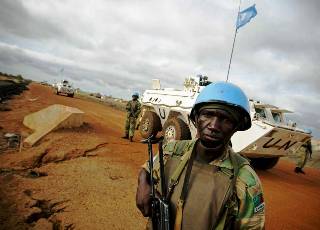S. Sudan welcomes UN decision over Abyei access
May 4, 2013 (JUBA) – South Sudan on Saturday welcomed a United Nations decision, which allows UN personnel to access the contested oil-producing region of Abyei, using any travel means available.

UN personnel, as part of the SOFA, are allowed to travel to the disputed region, either for immediate assessment, or to conduct and respond to daily needs of the humanitarian related activities in the region.
But the world body insists it has often been difficult for its personnel to obtain visa approval, mainly from the Sudanese Foreign Affairs ministry, despite the agreement, which the two countries signed. Sudanese authorities reportedly demand foreign nationals working for the UN to get visas from Khartoum only, saying Abyei was under its administrative control.
South Sudan, however, argues that the position of the Sudanese government neither reflects the status of the contested region, nor the agreement reached.
“South Sudan welcomes the decision of the United Nations and will do its best to unconditionally facilitate movement of the UN personnel seeking access to Abyei,” Nhail told Sudan Tribune Saturday, without giving further details.
The minister’s remarks was in response to a statement by the Resident and Humanitarian Coordinator’s Office in Sudan which referred to the previous communication with authorities over the need to provide access to UN personnel travelling to the area to respond to the humanitarian needs.
The 22 April statement, also obtained by Sudan Tribune, was addressed to protocol department at the Sudanese Foreign Affairs ministry.
A UN official working in Abyei said that no response has so far been received from Sudanese authorities, while South Sudan indicated it has no objections.
“I have not seen any response from the government of Sudan. Our office is actually the one that deals with such matters. The government of South Sudan has indicated no objection to providing access to our personnel seeking to enter the region for humanitarian assignments and other relief-related activities approved by UN,” said the official, who spoke on condition of anonymity.
They have expressed readiness to provide assistance without any condition, especially approval of visas, he added.
The UN made this decision after failing to get response to repeated requests seeking permission from authorities in Sudan to access the area.
“The office of the United Nations resident and humanitarian coordinator presents its compliments to the ministry of foreign affairs in the Sudan and has the honour to refer to previous correspondence relating to the permission required by UN personnel to travel to Abyei,” the UN letter reads in part.
It further states, “Based on the lack of response from the authorities concerned, the needs of the people of Abyei and the need to maintain UN programmes and project active, the UN resident and humanitarian coordinator and UNDP RR [Resident Representative] has authorised all UN personnel to access Abyei by any mean of travel available to the UN including from neighbouring countries.”
South Sudan’s president, Salva Kiir, says the fate of the disputed oil-producing border region Abyei remains his government’s top priority following the country’s secession from Sudan in July 2011.
Kiir’s remarks have raised expectations that direct negotiations on the issue may lead to more progress on the issue when he visits Khartoum for the first time since October 2011, to witness delivery of the first oil shipment to international markets through the Sudanese territory.
The status of Abyei has not been resolved despite steps which Sudan and South Sudan have taken since March to normalise their relations, after months of intermittent clashes along their undemarcated frontier.
Abyei’s status was the most sensitive issue left unsettled when South Sudan separated in 2011.
The territory was to hold a referendum in January 2011 on whether it belonged with the north or South, but disagreement on who could vote stalled the ballot.
Last year, the African Union mediation team proposed that a referendum be held in the contested region this October, but that only those residing permanently in the area would be allowed to vote in the plebiscite, and decide whether they want to join Sudan or South Sudan.
This proposal would effectively make the majority of voters come from the Dinka Ngok tribe, aligned with South Sudan, thus putting the Arab Misseriya nomads, who spend several months in Abyei every year grazing, not part of the voting.
According to the mediators, exclusion of the Misseriya nomads, in line with the decision of the Hague-based arbitration court, which defined the territory of the nine Ngok Dinka chiefdoms in July 2009.
However, Sudan swiftly rejected the plan, which received the blessing of the AU Peace and Security Council (AUPSC)
(ST)
